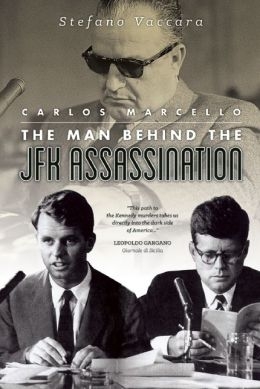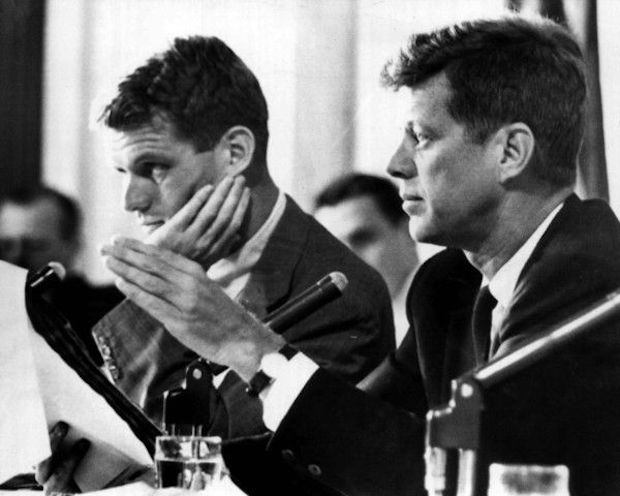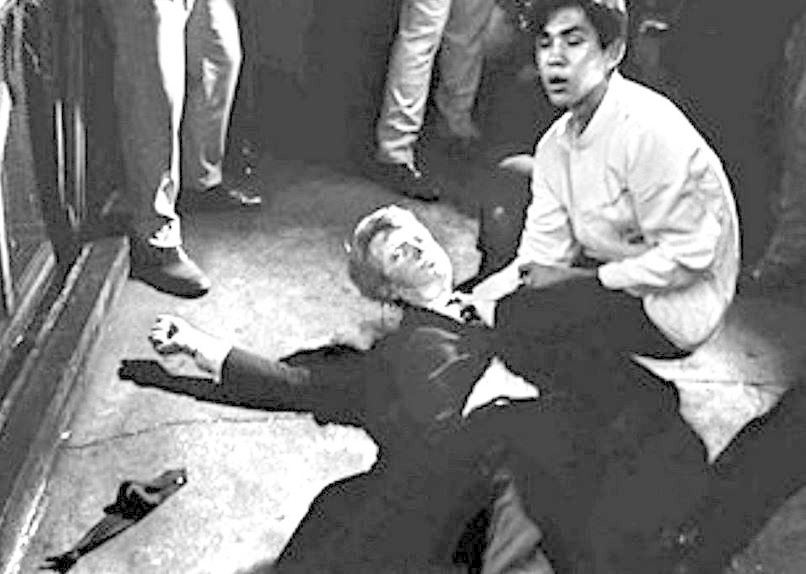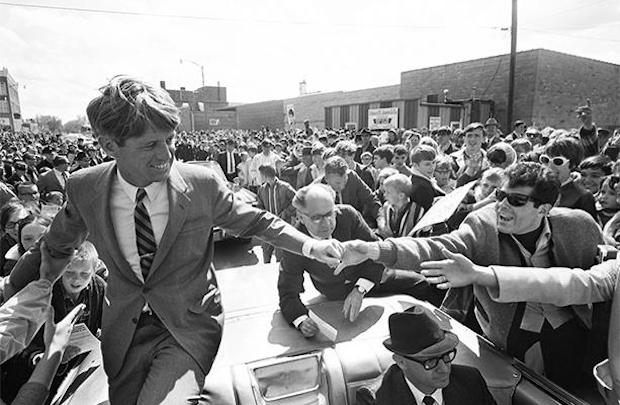What would the United States, and the world, be like today if on November 22nd 1963, President John F. Kennedy had not been assassinated in Dallas? This is a question that millions of Americans and people around the world–even those born after 1963–have asked themselves at least once in their lives. But how many of them have ever posed this question, this time substituting the first letter of the initials JFK with an “R”, the last digit of 1963 with an “8”, and then flying from Dallas to Los Angeles?
Fifty years ago, on June 5th 1968, during a crucial night in the Democratic primaries that would lead to the nomination as presidential candidate, Robert Francis Kennedy – Bobby, for his friends and family — died in LA. He was Bob to his many supporters, who, in 1968, were becoming an unstoppable avalanche capable of taking him to the Oval Office where he had already been his brother’s most heeded “advisor”.

But let’s step back 5 years. Before the Air Force One that was transporting JFK and First Lady Jacqueline landed in Dallas on that fateful day in 1963, Bobby was, after the president, the most “dangerous” man in the United States. In fact, given that his boss was his brother, he was the most powerful Attorney General in American history. Jack not only thought the world of him, but he trusted him totally; even if he discerned a certain rigidity in his character. In fact, RFK’s nickname amongst family members was “Black Bobby,” precisely for his taciturn, and above all, cynical stance towards every type of idealism. Indeed, after completing his studies at Harvard, unlike JFK, the law graduate, RFK went to work as a legal assistant for the junior senator from Wisconsin, Joseph McCarthy; the same man who would give his name to the terrible “McCarthyism”, or the infamous Communist witch hunt.
But there would be different “ideological” changes in RFK’s career. In fact, the obsession of Communism as the enemy of the American people that is always lurking in the shadows, will soon be substituted by the young attorney with another danger for American society: the Mafia. After his experiences with McCarthy, Kennedy went to work for the Senate’s McClellan Committee, which was investigating the relationship between the labor unions and organized crime racketeering – a committee that even his older brother, by now a senator, was sitting on.
Here, RFK noticed how influential the Mafia had become in the labor world and in that of American labor unions. Everyone remembers the Kennedy’s feud that started with Jimmy Hoffa, the head of the Teamsters Union. However in 1959, RFK also began another, much more perilous, feud, which would continue until his death: the one with Carlos Marcello (born Calogero Minacori), boss of the oldest Mafia family in America, from New Orleans. RFK called Marcello to testify in Washington, and there, the young Kennedy, seated next to his older brother, interrogated the Mafia head of Sicilian origins, whose emigrant parents, from the province of Agrigento (Ravanusa), had never naturalized him as an American citizen. Pointing his finger at him–after Marcello had taken the Fifth Amendment and refused to answer his questions—RFK shouted, “Mr. Marcello, you are not even a citizen and you do not merit living in this country and we will do everything possible to get you out of the United States forever”.

When RFK spoke these words, he was still a simple lawyer, even though he was working as an adviser for an important Congressional Committee. In less than two years he would be nominated by his brother, now elected President, as Attorney General, thus becoming the most powerful Attorney General in the world.
Before even occupying that hot seat, RFK had theorized and made public what he would do when he would finally have the power to act. His book, titled, The Enemy Within, was published in 1960, long before JFK’s election to the White House. In it, he claimed that the main enemy capable of destroying American freedom and prosperity “from within” was not Communism, but the Mafia!

One of the first acts that RFK brought forth as Attorney General was precisely that of wanting to expel Carlos Marcello from the United States. And he did so in an unconstitutional manner, having him “kidnapped” by federal agents, dragging him onto a plane, and literally throwing him onto the airport runway of Guatemala City, the capital of the country where Marcello had obtained citizenship using false documents — and RFK knew this. But since he was unable to send him to Italy (it refused to take him) Marcello had bribed some Italian officials in charge of the paperwork, and RKF took advantage of the Guatemalan citizenship, even if it had been done ad hoc by Cosa Nostra’s boss to remain close to New Orleans.
We cannot recount in this article all of the phases of this “feud” between RFK and Marcello, so for purposes of convenience, you can refer to my book here. But surely, when in Dallas in 1963, two days after JFK’s assassination, a certain Jack Ruby (a nightclub manager and Marcello’s employee) assassinated Lee Harvey Oswald inside a police station, Attorney General Robert Kennedy had already understood who was behind his brother’s murder. “The enemy within” — that Mafia that RFK understood would not act without the protection and the help of “powerful backers”, of that establishment that, through the exchanges of favors and collusion, nurtures and strengthens its power. It is not by chance that JFK was killed in Texas, the political stronghold of the man who would take JFK’s place as president, and also territory under the “jurisdiction” of the New Orleans’ Mafia.
The FBI, with its strange investigations, and the Johnson administration, with its staging of the Warren Commission, will take great care to dodge the truth regarding the conspiracy, which will remain concealed for over 50 years. Despite President Trump’s “threats of blackmail”, it was in fact decided that these secrets would still be maintained. But just two days after Dallas, the Attorney General understood that his brother, the President, was dead also as a result of his battle against the Mafia.
When, in September 1964, RFK resigned as Attorney General and went on the campaign trail to become the Senator from New York state, Bobby entered another stage of his brief life, being no longer the “dark” conservative, but, similarly to Jack in his last period, a supporter of the “new frontier” and of “civil rights”. Even RFK had at this point turned to “Kennedy-like populist idealism”, directed towards that America with the greatest need for rights and opportunity.
Robert Kennedy knew his enemies well, and the archenemy not only ruled in New Orleans, but was also seated in the Oval Office of the White House, and so Bobby remained even more prudent during his years in the Senate. He concealed his intentions well and didn’t let on that he planned to set off on the campaign trail to win the White House — the only place from which he could have continued his brother’s political mission and also finally bring out the truth and justice regarding his death.
When in March of 1968 RFK decided to become a last minute candidate for the democratic nomination, perhaps he had already understood that LBJ would not be seeking re-election. At the same time, his was a very difficult fight, because despite his position against the Vietnam War, he had in Minnesota senator Eugene McCarthy a formidable adversary in gathering that pool of young, anti-war adult voters necessary to secure a win. So, after having lost in Oregon, on June 5, 1968, Kennedy won the most important race – California. The smile that he flaunted to the crowd flocking to the Ambassador Hotel in Los Angeles was the smile of someone who had a glimpse of his dream coming true 5 years after Jack’s death.
A few minutes after his victory speech, his campaign race was brought to a halt by gunshots. According to the “official truth”, they were all shots fired by a young Palestinian, Sirhan Sirhan, who was waiting for him in the hotel’s kitchen hallway, through which Kennedy would have to pass to get to the press conference out front — a strange decision made at the last moment.
RFK was pronounced dead at the hospital after 26 hours of agony. For America, who had just lost JFK– and less than two months prior had lost Martin Luther King— the shock continued. And yet, the people of the most powerful nation in the world, were again made to believe that after a young, crazy loner had killed President Kennedy – planning and doing everything on his own –– to then being in turn killed by a very shady individual named Jack Ruby, here we had yet another crazy person, another loner acting by himself, who would kill JFK’s brother, a man aspiring to become president, as well.

Sirhan, who was given the death penalty at his trial, remains alive in a California prison, because that state abolished the death penalty prior to carrying out his sentence. The young son of Christian Palestinian refugees, right from the first trial, would recount that he did not remember anything about the moment of the shooting. As if under hypnosis, just like in the movie, “The Manchurian Candidate”.
At the same time, an audio recording of the moment of the shooting would reveal that in those few seconds 13 shots had been fired. But Sirhan’s gun would only have been able to fire a maximum of 8, because according to testimony, the young man had been stopped right after firing off the first shots and would never have had the opportunity to reload the gun. At the same time, the shot that would prove fatal, after the hours of agony that JFK suffered, was that which wounded the senator in the head, entering from behind his ear, shot from a low angle. However, according to testimony, while Sirhan was firing at RFK, he always remained facing the senator, and was never up close.
Many people were wounded during the shooting. Among them, as the wonderful Netflix documentary, “Bobby Kennedy for President” explains quite clearly, the union official, Paul Schrade, who was wounded in the head, but miraculously survived, and who to this day remains convinced that Sirhan was not the only person firing shots that evening, and that there was a plot to kill Kennedy.
Now, – and this is a new development– even some of RFK’s children are finally convinced of this and want to have the case regarding their father’s death reopened. Besides Robert F. Kennedy Jr., who recently met with Sirhan Sirhan in jail, even his sister Kathleen Kennedy Townsend, ex-assistant governor of Maryland, stated in the Washington Post that “the case regarding her father’s assassination deserves to be re-opened”. Finally! What’s more, for quite some time now — at least 30 years — some very attentive researchers have written that even for RFK, there were strange coincidences and suspicions regarding his alleged assassin. Just as with Lee Harvey Oswald, who besides being born and raised in New Orleans, returned in the summer of 1963 to the city where Carlos Marcello reigned, to live in his uncle, Charles Murret’s, home – known for collecting illegal gambling debts for years that had been organized by the Mafia boss. That same Oswald, who will be seen for most of that summer keeping company in gay bars around New Orleans with the pilot David Ferrie (remember Joe Pesci in the movie JFK by Oliver Stone?), who works as an investigator for Carlos Marcello. And here’s a damning piece of coincidence: this young man of Palestinian origin worked as a stable hand at the racetrack controlled by Los Angeles Mafia boss, Micky Cohen — Carlos Marcello’s ally and close friend.
After the funeral held in New York on June 8, 1968, RFK’s body was transported to Washington, D.C. by train. During that trip, the spectacle of American people lined up all along the route acknowledged the courage in the ideas of the “democratic populist” Kennedy. Let’s stop here for a moment and go back to the beginning of this long article.
So, what would America, and the world, look like if RFK had continued his “populist” campaign for the White House and had beaten—as his brother Jack had done 8 years prior–Richard Nixon? Would America and world be any different? Today, after half a century, we are witnessing another type of populism making its way forward and winning, but it is not RFK’s inclusive one, which supported the weak without having to go against the weakest, a populism for a large coalition of minorities — the working class and white Americans, all pro civil, economic, and social rights, and anti-war, which RFK promised to defend during his political campaign. No, today it has to do with “Trump-like populism”, imitated in Italy by Matteo Salvini’s Lega Nord party and its supporters (along with the Five Star Movement that seems to have been hypnotized), which is based on putting up walls and taking down “the enemies of the people”, including journalists and all those who do not kneel before the myth of “Make America Great Again” or the rallying cry, “Italians First!”.

Knowing the truth about who was responsible, and why every possibility of that inclusive Kennedy-like populism was shut down, might perhaps wake us up from the spell of Trumpism. That early populism, as represented by the trio JFK-MLK-RFK, the three “populists” that they still want us to believe had been killed in America by three lone gunmen, loner assassins, has arrived right on time after all, but as a result of a day in 1963 in Dallas, and a night in 1968 in Los Angeles.
Translation by Emmelina De Feo












